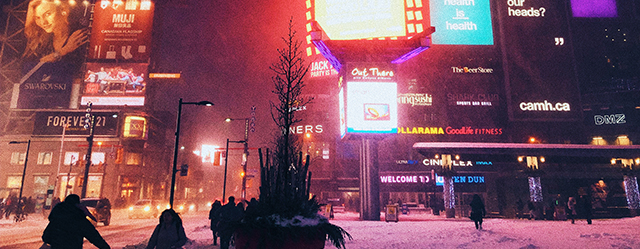
Ahoy! This is the Weekly Churn, where every Sunday I post about what I’ve been reading, watching, and thinking about over the previous week. This week got away from me, so it’s being posted on the Monday instead.
Sandra Newman recently wrote in The Guardian about how the literary genre of the utopia has been largely abandoned in favour of its shadow genre, the dystopia. For some reason she believes this shift to be in part the result of the Soviet Union under Stalin being the only real-world utopian project people have had to examine,[ref]While the communist revolution in Russia may have been a utopian project, the Soviet Union under Stalin was not; it was the consolidation of power in the hands of a monster. There is an argument to be made that totalitarianism is a utopian political philosophy, but I don’t agree. But there are genuine, and more recent, real-world utopian projects to look at.[/ref] and in part the result of cynicism and nihilism run amok, a surrendering to conservative criticisms of liberal and left-wing idealism. She also believes that this shift causes such a surrender, enacting a vicious cycle in which we come to believe that any hope for a better world is lost, or that change for the better can only happen accidentally.
Now the genre consists almost entirely of nightmarish visions of social engineering gone wrong. The best-known Christian utopia is no longer the peaceful realm of Thomas More, but Gilead in The Handmaid’s Tale. Any technological breakthrough is imagined to be a licence for new atrocities, as in Never Let Me Go or Cloud Atlas, not to mention the dystopian cornucopia that is Black Mirror. Even Ursula K Le Guin felt compelled to add a poison pill to her utopia: in idyllic Omelas, the citizens’ happiness is bought by the eternal torture of a child. A steady diet of this fare has left us with an ingrained suspicion of social innovation; in our fictive experience, it always leads to the miseries of (Terry Gilliam’s) Brazil, The Giver or The Purge. We’ve all seen so many stories where the road to hell is paved with good intentions that we can’t hear about utopias without smelling brimstone.
Conservatives use this conditioned response to argue against everything from wind farms to universal healthcare – surefire paths to dystopia, if the aim is to benefit mankind.
She’s not wrong that there has been a political surrender to conservativism in our society, but it’s not fucking Cloud Atlas that caused it.
The reason we all smell brimstone is because utopias are not just declarations of what their architects think a better world looks like, they are declarations of who they are willing to put through hell to make them happen, who they think matters, and who they think does not. There is always someone they think does not. Always. It might be helpful to look at some utopian novels, or novels that contain utopian elements, so we can see exactly what that looks like.
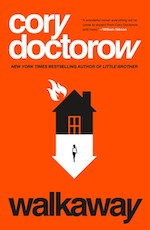 Cory Doctorow’s Walkaway tries to imagine a society where income inequality and the intense class stratification—indeed, class stratification of any kind—of our present are eradicated. What Doctorow imagines instead is a world where middle class computer engineers and designers are the most likely people to be victimized by income inequality, the most likely to resist, the most likely to organize; there is no need for him to call back to the working class history of organized labour and social justice, since working class people don’t exist in the world of his novel in the first place. His utopia, despite its new and interesting way to distribute material and labour resources, still values the exact same kinds of labour as the neoliberal society that preceded it, in exactly the same way. Doctorow’s class consciousness as expressed in Walkaway is skin deep at best, and it is more important to him to play around with 3D printers and other toys than to imagine what might happen to waitresses and garbage collectors. Even his Indigenous characters are valued by the narrative not because their traditional ways of knowing and doing may have something to teach the rest of us, or because their cultures have value in their own right, but because of their status as outsiders from mainstream society. I get a whiff of brimstone from Walkaway because people like my mother and father, people like me for most of my life, don’t have a place in Doctorow’s utopia. None of us ever learned how to code.
Cory Doctorow’s Walkaway tries to imagine a society where income inequality and the intense class stratification—indeed, class stratification of any kind—of our present are eradicated. What Doctorow imagines instead is a world where middle class computer engineers and designers are the most likely people to be victimized by income inequality, the most likely to resist, the most likely to organize; there is no need for him to call back to the working class history of organized labour and social justice, since working class people don’t exist in the world of his novel in the first place. His utopia, despite its new and interesting way to distribute material and labour resources, still values the exact same kinds of labour as the neoliberal society that preceded it, in exactly the same way. Doctorow’s class consciousness as expressed in Walkaway is skin deep at best, and it is more important to him to play around with 3D printers and other toys than to imagine what might happen to waitresses and garbage collectors. Even his Indigenous characters are valued by the narrative not because their traditional ways of knowing and doing may have something to teach the rest of us, or because their cultures have value in their own right, but because of their status as outsiders from mainstream society. I get a whiff of brimstone from Walkaway because people like my mother and father, people like me for most of my life, don’t have a place in Doctorow’s utopia. None of us ever learned how to code.
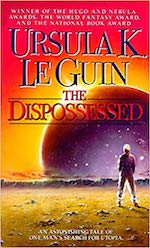 Newman cites Ursula K. Le Guin in her article, so let’s take a look at one of her most famous novels, The Dispossessed. The Dispossessed contains not one utopia, but several—the number will vary depending on your point of view. The only one I’m going to worry about is the anarcho-syndicalist society on Annares, since it fits the common idea of a utopia most closely. It’s a society where everyone is equal, where there are no leaders and followers, no masters and servants, with an almost pathological focus on selflessness and the denial of ego. Everyone’s basic needs are provided for, and while resources are scarce, for the most part no one goes hungry. But what does it take to support this place? Work, for a start. Everyone in Annares is a labourer, regardless of what other passions they pursue, or whatever else they might contribute to their society. The toil is no less than in any of the other societies in the novel, indeed is considerably more at times, and it’s an open question as to whether the material rewards are any better. And there are other costs. Despite having what superficially appears to be an unusual degree of freedom, the Annaresti face profound social pressure to conform, less to a strict set of behaviours than to a strict set of ideas. The normal family structure is one that most of us would likely find quite alienating. Private property isn’t entirely unknown, but it’s heavily frowned upon. The language the Annaresti use is heavily policed by peer pressure, and privacy is virtually unknown. What Annares lacks in physical oppression it more than makes up for with psychological pressure and shame. The Annaresti have tremendous nominal freedom, but in practice they can only exercise that freedom in heavily proscribed ways.
Newman cites Ursula K. Le Guin in her article, so let’s take a look at one of her most famous novels, The Dispossessed. The Dispossessed contains not one utopia, but several—the number will vary depending on your point of view. The only one I’m going to worry about is the anarcho-syndicalist society on Annares, since it fits the common idea of a utopia most closely. It’s a society where everyone is equal, where there are no leaders and followers, no masters and servants, with an almost pathological focus on selflessness and the denial of ego. Everyone’s basic needs are provided for, and while resources are scarce, for the most part no one goes hungry. But what does it take to support this place? Work, for a start. Everyone in Annares is a labourer, regardless of what other passions they pursue, or whatever else they might contribute to their society. The toil is no less than in any of the other societies in the novel, indeed is considerably more at times, and it’s an open question as to whether the material rewards are any better. And there are other costs. Despite having what superficially appears to be an unusual degree of freedom, the Annaresti face profound social pressure to conform, less to a strict set of behaviours than to a strict set of ideas. The normal family structure is one that most of us would likely find quite alienating. Private property isn’t entirely unknown, but it’s heavily frowned upon. The language the Annaresti use is heavily policed by peer pressure, and privacy is virtually unknown. What Annares lacks in physical oppression it more than makes up for with psychological pressure and shame. The Annaresti have tremendous nominal freedom, but in practice they can only exercise that freedom in heavily proscribed ways.
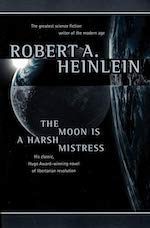 We ought to also look at Robert A. Heinlein’s The Moon Is a Harsh Mistress, which is like Cory Doctorow’s Walkaway in some ways. It is a utopia in progress rather than a fully-realized one. In the novel, the moon has become a penal/resource colony for earth, and also a quasi-libertarian society. Its system of justice is ad hoc and heavily based on both reputation and the bizarre belief that cash somehow guarantees good faith. It also depends entirely on technological intervention to function. In order to justify a society that ultimately doesn’t take care of its weak or infirm in any meaningful way, Heinlein assumes that most citizens will be highly technologically literate, and that technology has advanced to the point where physical limitations that may lead to structural inequalities can easily be circumvented; for example: artificial limbs that can provide better-than-human capabilities in the event of accident. Essentially, anything that might create a structural disadvantage is hand-waived away. Heinlein is clearly presenting this system as utopian, but it is cruel, dangerous, and subject to easy authoritarian manipulation by various characters. For anyone who values compassion, Heinlein’s utopia would be a nightmare.
We ought to also look at Robert A. Heinlein’s The Moon Is a Harsh Mistress, which is like Cory Doctorow’s Walkaway in some ways. It is a utopia in progress rather than a fully-realized one. In the novel, the moon has become a penal/resource colony for earth, and also a quasi-libertarian society. Its system of justice is ad hoc and heavily based on both reputation and the bizarre belief that cash somehow guarantees good faith. It also depends entirely on technological intervention to function. In order to justify a society that ultimately doesn’t take care of its weak or infirm in any meaningful way, Heinlein assumes that most citizens will be highly technologically literate, and that technology has advanced to the point where physical limitations that may lead to structural inequalities can easily be circumvented; for example: artificial limbs that can provide better-than-human capabilities in the event of accident. Essentially, anything that might create a structural disadvantage is hand-waived away. Heinlein is clearly presenting this system as utopian, but it is cruel, dangerous, and subject to easy authoritarian manipulation by various characters. For anyone who values compassion, Heinlein’s utopia would be a nightmare.
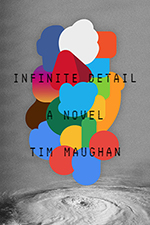 Finally, we have Tim Maughan’s Infinite Detail, a book I have written about before, and which is closer to The Dispossessed than any of the other examples I’ve used here, though most would probably say it resembles Walkaway. It’s set in two time periods, a very near future and then a few years further down the road, labelled “before” and “after,” respectively. In the “after,” a hacker group called DRONEGOD$ has managed to take the entire Internet offline and society has broken down into hyper-local communities held together by violence and fear. Their manifesto identifies our modern world as a dystopia that arrived so quietly we didn’t even know we were living in one.[ref]The scariest thing about this manifesto is there isn’t really anything in it that isn’t true.[/ref] Shutting down the Internet is the first step in remaking the world. The manifesto restates the same reassuring lie that all revolutions offer: “This is going to be fun, but also a tough ride. Times will be hard. But it’ll be worth it in the end. You’ll see.” So what happens? The state as a concept mostly collapses, and self-determination happens, and it happens for real. There’s a great exchange between two characters near the end of the novel that is the most honest thing I’ve ever seen written about a utopian revolution.
Finally, we have Tim Maughan’s Infinite Detail, a book I have written about before, and which is closer to The Dispossessed than any of the other examples I’ve used here, though most would probably say it resembles Walkaway. It’s set in two time periods, a very near future and then a few years further down the road, labelled “before” and “after,” respectively. In the “after,” a hacker group called DRONEGOD$ has managed to take the entire Internet offline and society has broken down into hyper-local communities held together by violence and fear. Their manifesto identifies our modern world as a dystopia that arrived so quietly we didn’t even know we were living in one.[ref]The scariest thing about this manifesto is there isn’t really anything in it that isn’t true.[/ref] Shutting down the Internet is the first step in remaking the world. The manifesto restates the same reassuring lie that all revolutions offer: “This is going to be fun, but also a tough ride. Times will be hard. But it’ll be worth it in the end. You’ll see.” So what happens? The state as a concept mostly collapses, and self-determination happens, and it happens for real. There’s a great exchange between two characters near the end of the novel that is the most honest thing I’ve ever seen written about a utopian revolution.
“Well, what did you think was going to happen? After you broke everything? Really? What did you think? That everything would magically take care of itself? That this network of yours would somehow provide all the answers?”
“We didn’t pretend to have answers. Not for everything. That wasn’t what we were fighting for. We were fighting for people to able to decide things for themselves, Grids. To start again. We were fighting for self-determination—”
“Well then, you got what you wanted. Self-determination? You’re looking at it.” He thumps his chest with his fist again. “I’m self-determination. The [Land Army] is self-determination. The city council is self-determination. That skinhead militia down in Knowle that’s lynching Muslims? That’s self-determination. That’s what it looks like. Lots of gangsters and warlords and fucking terrified people trying to look after themselves, trying to protect their own, and fuck everybody else. […] Your self-determination is a fucking power vacuum, that’s all it is. […]”
Maughan, like Le Guin, recognizes the problems of the world, and understands the need for change, but also understands that no society, no vision, comes without suffering. Utopia is a myth, a no-place. The kind of utopia written by Plato or Thomas More is long out of favour for a number of reasons, not least of which that we, as a society, have finally started to understand that these visions have consequences in the real world.[ref]And let’s be honest, the rise of psychological realism is probably also a huge culprit here.[/ref] Just as Star Trek can make us feel like we’re one big, welcoming family, so too have the greatest crimes we have committed against each other been justified by these visions. We now know that what all those classical utopias had in common was not that they were imagining better worlds: it was their utter inhumanity.
Anyway, the kind of utopia our novelists create hardly matters given that we already live in one. Two, really.
The first is an economic system called “neoliberalism.” There are some great technical definitions of neoliberalism, but basically they all boil down to this: it is an economic system that believes the highest good is achieved under regimes of deregulation and the centring of power in the private sector, the hyper-commodification of all spheres of life, and the prioritizing of exchange value over use value or social value in all circumstances. It’s the economic system that most of us in the so-called Western World have been living under for the last several decades, although to varying degrees and intensities. I won’t get too deeply into it here; there are plenty of resources available if you want to understand its history or why I call it utopian.[ref]Hint: it was supposed to make for a better, more fair world.[/ref] But neoliberalism is the reason you can’t afford to buy a home, and why your rent is 60% of your income. It’s the reason you’re working on contract instead of at a permanent position. It’s the reason you have a side gig instead of a union. It’s the reason you can’t afford daycare or to send your kids to university. It’s the reason you’re going to die younger than your parents did, and the reason why you’ll die in harness instead of retiring. It’s also the reason the second utopia we live inside is able to exist at all.
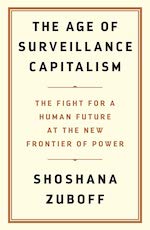 I don’t know that this second utopia has a name. It’s the vision of the world given to us by silicon valley, within the system of neoliberalism and funded by a system of surveillance and behavioural manipulation Shoshana Zuboff calls “surveillance capitalism.” It’s cellular phones and smart cities and Uber. As Adam Greenfield describes in his post Uber, or the Technics and Politics of Socially Corrosive Mobility, it is also the belief that “interpersonal exchanges are more appropriately mediated by algorithms than by one’s own competence.” For some time now technology companies have been selling us—the middle class and wealthier “us”—a world in which as many aspects of our lives as possible, from our thermostats and grocery shopping to feeling a loved one’s heartbeat against our skin, are mediated by technology. We are sold “smart” appliances and clothing, cell phone apps and other software, sensors and networked lightbulbs and even coffee mugs, and we are told these things will connect us. We are given algorithms that decide what news we should read, blockchain-based contracts that don’t really understand what contracts are or why they work how they do, and a permanent, public record of our actions that finally matters the way your high school principal threatened it would. In short, we have an industry that is using unprecedented knowledge and economic strength to push our culture into violating one of the most fundamental and hard-won pieces of wisdom we have about how societies work: there are no technological solutions to social problems. Why? Because those motherfuckers can make a lot of money from it. But hey, that’s what utopias are like; they aren’t for everybody.
I don’t know that this second utopia has a name. It’s the vision of the world given to us by silicon valley, within the system of neoliberalism and funded by a system of surveillance and behavioural manipulation Shoshana Zuboff calls “surveillance capitalism.” It’s cellular phones and smart cities and Uber. As Adam Greenfield describes in his post Uber, or the Technics and Politics of Socially Corrosive Mobility, it is also the belief that “interpersonal exchanges are more appropriately mediated by algorithms than by one’s own competence.” For some time now technology companies have been selling us—the middle class and wealthier “us”—a world in which as many aspects of our lives as possible, from our thermostats and grocery shopping to feeling a loved one’s heartbeat against our skin, are mediated by technology. We are sold “smart” appliances and clothing, cell phone apps and other software, sensors and networked lightbulbs and even coffee mugs, and we are told these things will connect us. We are given algorithms that decide what news we should read, blockchain-based contracts that don’t really understand what contracts are or why they work how they do, and a permanent, public record of our actions that finally matters the way your high school principal threatened it would. In short, we have an industry that is using unprecedented knowledge and economic strength to push our culture into violating one of the most fundamental and hard-won pieces of wisdom we have about how societies work: there are no technological solutions to social problems. Why? Because those motherfuckers can make a lot of money from it. But hey, that’s what utopias are like; they aren’t for everybody.
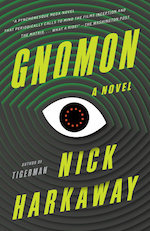 There are some other novels that address technologically-mediated utopias, and most are highly critical of such societies. Nick Harkaway’s Gnomon comes to mind, as does Malka Older’s Centenal Cycle trilogy.[ref]I have only read the first two; I’m waiting for the third to be released in paperback.[/ref] They all offer criticisms of such utopias, but none are as compelling as the sort of thing Le Guin does in The Dispossessed. The fundamental difference is how those utopian systems operate in and on the lives of those characters that the narratives want us to feel the most sympathy for.
There are some other novels that address technologically-mediated utopias, and most are highly critical of such societies. Nick Harkaway’s Gnomon comes to mind, as does Malka Older’s Centenal Cycle trilogy.[ref]I have only read the first two; I’m waiting for the third to be released in paperback.[/ref] They all offer criticisms of such utopias, but none are as compelling as the sort of thing Le Guin does in The Dispossessed. The fundamental difference is how those utopian systems operate in and on the lives of those characters that the narratives want us to feel the most sympathy for.
In the case of Gnomon there are so many blind alleys and layers of unreality that it will be difficult to untangle in the space available here, so instead I’m going to deal mostly with the first two novels of the Centenal Cycle. Malka Older does present sympathetic characters in both Informocracy and Null States who resist the dominant quasi-state-surveillance paradigm. Those characters tend to be likeable, intelligent, and respected by other characters. They are not, however, major characters, and are never the characters for whom the narrative demands we feel the most sympathy.
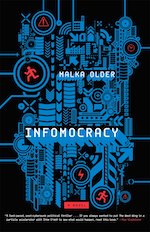 The first two books of the Centenal Cycle are in some ways about how hyper-local governance can fail when relying heavily on technocratic tools and surveillance.[ref]They are about other things as well, but they aren’t relevant to what I’m discussing here.[/ref] Where the problem lies is how those failures are integrated into the narrative—and frankly, this has implications for how we look at so-called “smart city” proposals in the real world. The ways in which the system creates injustice for the most sympathetic characters in the first two books of the Centenal Cycle are the result of failures of that system to function as it was designed to, because of sabotage or other interference, lack of resources, or some other outside or secondary cause. This narrative structure does not undermine the narrative’s initial positive presentation of that system; instead, it undermines those characters who critique it. Structurally, because it is when the system fails to behave as designed that creates injustice, not when it succeeds, it makes the problem of injustice within that system one of implementation rather than a one of its very nature. Contrast this with The Dispossessed, where the novel’s most sympathetic characters face injustice when the systems they live under work exactly as intended; that structure serves to undermine those systems and reinforce critiques of them. The difference is striking. I’m given to understand that in the third Centenal novel, State Tectonics, the system is critiqued more directly, but ultimately that doesn’t matter. Regardless of the author’s intentions, structuring the problem as fundamentally one of implementation rather than nature for the first two thirds of a work undermines any existential critiques the narrative may also offer.
The first two books of the Centenal Cycle are in some ways about how hyper-local governance can fail when relying heavily on technocratic tools and surveillance.[ref]They are about other things as well, but they aren’t relevant to what I’m discussing here.[/ref] Where the problem lies is how those failures are integrated into the narrative—and frankly, this has implications for how we look at so-called “smart city” proposals in the real world. The ways in which the system creates injustice for the most sympathetic characters in the first two books of the Centenal Cycle are the result of failures of that system to function as it was designed to, because of sabotage or other interference, lack of resources, or some other outside or secondary cause. This narrative structure does not undermine the narrative’s initial positive presentation of that system; instead, it undermines those characters who critique it. Structurally, because it is when the system fails to behave as designed that creates injustice, not when it succeeds, it makes the problem of injustice within that system one of implementation rather than a one of its very nature. Contrast this with The Dispossessed, where the novel’s most sympathetic characters face injustice when the systems they live under work exactly as intended; that structure serves to undermine those systems and reinforce critiques of them. The difference is striking. I’m given to understand that in the third Centenal novel, State Tectonics, the system is critiqued more directly, but ultimately that doesn’t matter. Regardless of the author’s intentions, structuring the problem as fundamentally one of implementation rather than nature for the first two thirds of a work undermines any existential critiques the narrative may also offer.
This is also why it’s a bad idea to argue about specific elements of the Quayside project, like reconfigurable parking spaces or tall-timber construction. By arguing about the implementation of a project first and the nature of that project second you’ve already conceded the validity of that project’s most fundamental assumptions. It’s possible to claw back rights and authority and agency from that point, but it’s an order of magnitude harder than if they were baked in right from the start.
Anyway, I had a whole section I wanted to write about other kinds of utopias, like municipalist stuff and how much endless fucking work those idealized societies are, but we’re coming dangerously close to 3,000 words and I’m tired. You want utopia, just look around. There’s all the utopia you could want, right here.